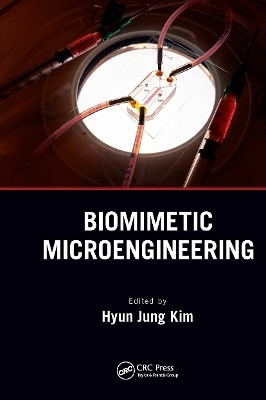
Biomimetic Microengineering
CRC Press (Verlag)
978-1-032-65252-8 (ISBN)
This book will examine the relevant biological subjects involved in biomimetic microengineering as well as the design and implementation methods of such engineered microdevices. Physiological topics covered include regeneration of complex responses of our body on a cellular, tissue, organ, and inter-organ level. Technological concepts in cell and tissue engineering, stem cell biology, microbiology, biomechanics, materials science, micro- and nanotechnology, and synthetic biology are highlighted to increase understanding of the transdisciplinary methods used to create the more complex, robust biomimetic engineered models. The effectiveness of the new bioinspired microphysiological systems as replacements for existing in vitro or in vivo models is explained through sections that include the protocols to reconstitute three-dimensional (3D) structures, recapitulate physiological functions, and emulate the pathophysiology of human diseases. This book will also discuss how researchers can discover bridge technologies for disease modeling and personalized precision medicine.
Features
Focuses on cutting edge technologies that enable manipulation of living systems in a spatiotemporal manner.
Incorporates research on reverse engineering of comples microenvironmental factors in human diseases.
Highlights technologies related to patient-specific personalized medicine and their potential uses.
Written by chapter authors who are highly respected researchers in science and engineering.
Includes extensive references at the end of each chapter to enhance further study.
Hyun Jung Kim is an Assistant Professor in the Department of Biomedical Engineering at The University of Texas at Austin. After receiving hois Ph.D. degree at Yonsei University in the Republic of Korea, he did extensive postdctoral research at both the University of Chicago and the Wyss Institute at Harvard University. These efforts resulted in cutting-edge breakthroughs in synthetic microbial community research and organomimetic human Gut-on-a-Chip microsystem. His research on Gut-on-a-Chip technology leads to the creation of a microfluidic device that mimics the physiology and pathology of the living human intestine. Since 2015, he has explored novel human host-microbiome ecosystems to discover the disease mechanism and new therapeutics in inflammatory bowel disease and colorectal cancers at UT Austin. In collaboration with clinicians, his lab is currently developing disease-oriented, patient-specific models for the advancement in pharmaceutical and clinical fields.
Hyun Jung Kim is an Assistant Professor in the Department of Biomedical Engineering at The University of Texas at Austin. After receiving his Ph.D. at Yonsei University in the Republic of Korea, he did extensive postdoctoral research at both the University of Chicago and the Wyss Institute at Harvard University (under Professor Donald Ingber). These efforts resulted in cutting edge breakthroughs in synthetic microbial community research and organomimetic human Gut-on-a-Chip microphysiological system. His research on Gut-on-a-Chip technology leads to the creation of a microfluidic device that that mimics the physiology and pathology of the living human intestine. Since 2015, he has explored novel human host-microbiome ecosystems to discover the disease mechanism and new therapeutics in inflammatory bowel disease and colorectal cancer. In collaboration with clinicians, his lab is currently developing disease-oriented, patient-specific models for the advancement of Precision Medicine.
PART I Emulating the Microenvironment of a Living System. Emulating Biomechanical Environments in Microengineered Systems. Biomimetic Microsystems for Blood and Lymphatic Vascular Research. Multispecies Microbial Communities and Synthetic Microbial Ecosystems. PART II Enabling Technologies for Building a Biomimetic Model. Stem Cell Engineering. Organoid Technology for Basic Science and Biomedical Research. Design, Fabrication, and Microflow Control Techniques for Organ-on-a-Chip Devices. Microfluidic Techniques for High-Throughput Cell Analysis. 3D Printing and Bioprinting Technologies. PART III Pathomimetic Disease Modeling. Microengineered Models of Human Gastrointestinal Diseases. Respiratory Pathophysiology - Microphysiological Models of Human Lung. In Vitro Alzheimer’s Disease Modeling Using Stem Cells. PART IV Towards Translational Application and Precision Medicine. Manufacturing and Assembly of Micro- and Nano-scale Devices and Interfaces Using Silk Proteins. Microarray 3D Bioprinting for Creating Miniature Human Tissue Replicas for Predictive Compound Screening. Integration of the Immune System into Complex In Vitro Models for Preclinical Drug Development.
| Erscheinungsdatum | 23.08.2024 |
|---|---|
| Verlagsort | London |
| Sprache | englisch |
| Maße | 156 x 234 mm |
| Gewicht | 453 g |
| Themenwelt | Medizin / Pharmazie ► Physiotherapie / Ergotherapie ► Orthopädie |
| Naturwissenschaften ► Biologie | |
| Technik ► Maschinenbau | |
| Technik ► Medizintechnik | |
| Technik ► Umwelttechnik / Biotechnologie | |
| ISBN-10 | 1-032-65252-7 / 1032652527 |
| ISBN-13 | 978-1-032-65252-8 / 9781032652528 |
| Zustand | Neuware |
| Informationen gemäß Produktsicherheitsverordnung (GPSR) | |
| Haben Sie eine Frage zum Produkt? |
aus dem Bereich


